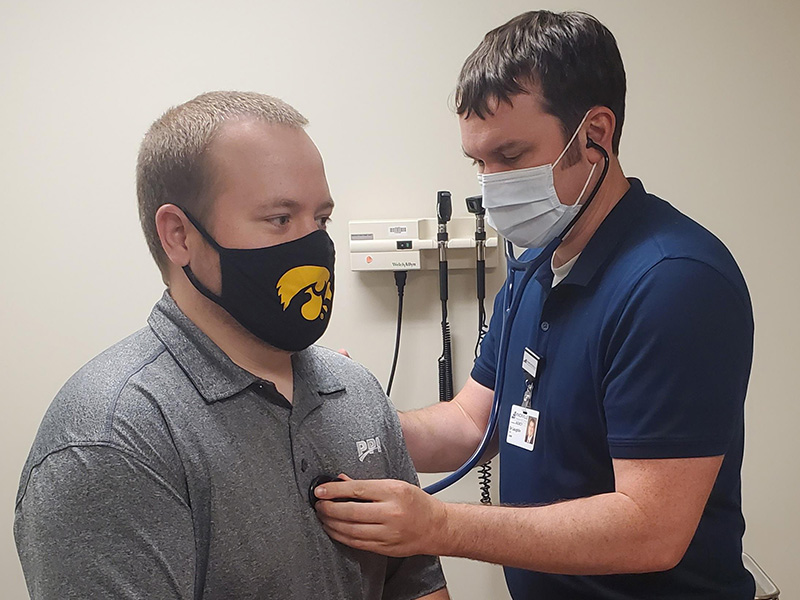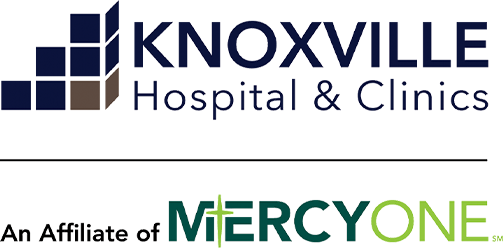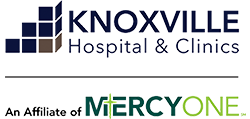KNOXVILLE, IA – Let’s be honest, men are usually not as diligent as women about seeing their health care provider regularly and often take better care of their car than their health. June is Men’s Health Month, and Knoxville Hospital & Clinics (KHC) urges men to make their own health a priority.
Men are more likely to suffer from chronic diseases
Men tend to assess their health as a low priority, though on average, men live five years fewer than women. Some of the most common conditions that affect men’s health include colon and colorectal cancer, prostate cancer, and heart disease.
According to the Centers for Disease and Prevention (CDC), heart disease is the leading cause of death for men in the United States, causing one in every four male deaths. Work-related stress and unhealthy habits can increase the risk of heart attack, hypertension, and stroke for men. Fortunately, developing healthy habits can help counter these risks. To stay healthy, it is recommended to:
- Exercise at least 30 minutes per day.
- Avoid all forms of tobacco.
- Maintain a healthy diet, including fruits, vegetables, and whole grains. Avoid sugary and highly processed foods.
- Drink alcohol in moderation, limiting yourself to one drink per day.
- Reduce everyday stress.
“Almost all health problems facing men are preventable. You can’t address a health issue if you don’t know it exists,” said Ryan Laughlin, DO, KHC Family Medicine provider. “Education and awareness are essential in getting men to be more engaged in their health.”
Health tips for men
While many men tend to put off seeing their health care provider for routine physicals and preventive screenings, another major risk factor for men is cancer. It’s important for men to know what to look for at each stage of life and what specific cancer screenings are recommended based on age.
- Men in their 20s and 30sneed to pay extra attention to their skin and watch out for testicular growths or masses. These things can be reviewed with a health care provider on a regular basis.
- Men at age 40-50 have additional types of cancer that become a greater risk. Colon cancer is often quiet until it is advanced. A colonoscopy screening and annual prostate cancer exam should be scheduled for all men at age 50, and those with a family history of colon cancers should start screening at an earlier age. Additionally, erective dysfunction/enlarged prostate, cardiovascular disease/high blood pressure, and stress/anxiety/depression can be of concern to men in this age group.
- Men ages 50-70are more susceptible to chronic diseases. If there is a family history of heart/cardiovascular disease, cancer, Chronic Obstructive Pulmonary Disease (COPD), or stroke, men should see their health care provider regularly.
Other important screenings for men include:
- High cholesterol. Beginning at age 35, men should get their cholesterol checked regularly – at least every five years. Men younger than age 35 could benefit from cholesterol testing if they smoke, have high blood pressure or diabetes, or have a family history of heart disease.
- High blood pressure.All men should get their blood pressure checked at least every two years or more often if recommended by their health care provider.
- Diabetes. Men should schedule a blood glucose test for diabetes if they have elevated cholesterol or high blood pressure. They should also have this test if they notice symptoms of diabetes, such as frequent thirst and urination, fatigue, and blurred vision. Healthy men should get screened every three years, starting at age 50.
As always, it is important to visit with your health care provider about the appropriate screenings for you. The age at which you begin screening depends on several things, including family history. You and your provider will decide which screenings are best for you.
The best preventative care starts early with a diet that is healthy, regular physical exercise, and healthy ways to manage life’s stresses.
Seeking a health care provider is critical to improving men’s health
Early detection and treatment can save lives. If you are looking to establish care with a new health care provider, finding a provider is simple. For more information about the providers and health care services at KHC, visit www.knoxvillehospital.org or call (641) 842-7211. Your health is our priority.
Photo caption: June is Men’s Health Month. Education and awareness are essential in getting men to be more engaged in their health. Tyler Pleggenkuhle sees KHC Family Medicine Provider Ryan Laughlin, DO, regularly to remain proactive in monitoring and maintaining his health – for his sake and his family.
Knoxville Hospital & Clinics is a non-profit community hospital serving Marion County and the surrounding area. Named a “Top 100 Critical Access Hospital” and Voted as Best of Red Rock Area’s “Best Place to Work” and “Best Hospitality”, KHC’s highly skilled medical staff and specialists provide personal, compassionate, and innovative quality health care to patients. For more information regarding this release and other happenings at Knoxville Hospital & Clinics, call the Public Relations office at (641) 842-1485.


